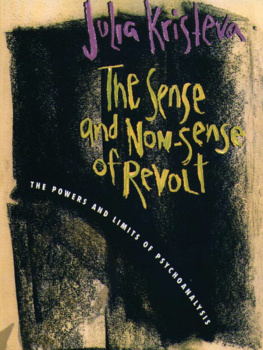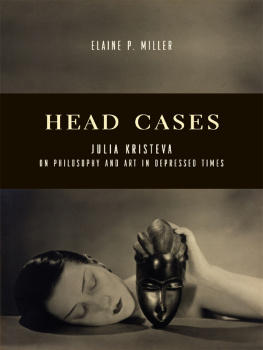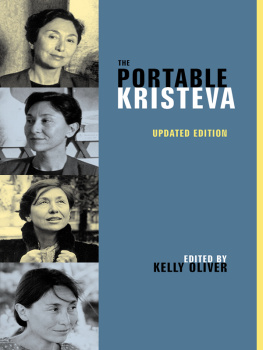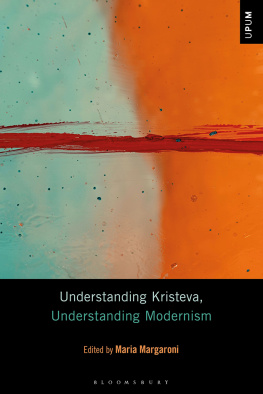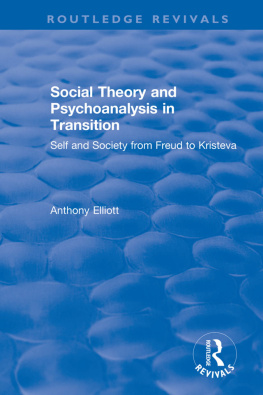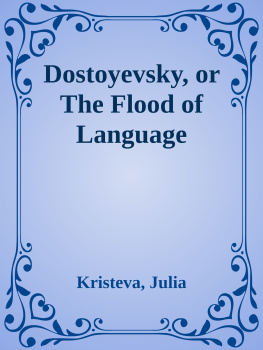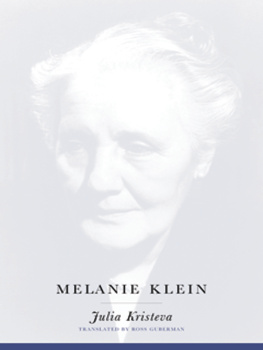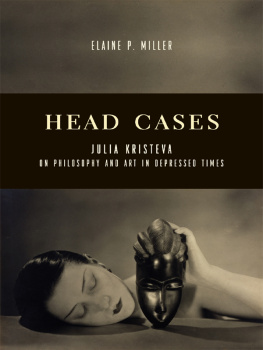SUNY series, Insinuations: Philosophy, Psychoanalysis, Literature
________________
Charles Shepherdson, editor
Kristeva's Fiction
Edited by
BENIGNO TRIGO

On the cover a photographic reproduction of Judith with the Head of Holofernes by Luchas Cranach the Elder (14721553) courtesy of Vanderbilt University.
Published by State University of New York Press, Albany
2013 State University of New York
All rights reserved
Printed in the United States of America
No part of this book may be used or reproduced in any manner whatsoever without written permission. No part of this book may be stored in a retrieval system or transmitted in any form or by any means including electronic, electrostatic, magnetic tape, mechanical, photocopying, recording, or otherwise without the prior permission in writing of the publisher.
For information, contact State University of New York Press, Albany, NY
www.sunypress.edu
Production by Ryan Morris
Marketing by Kate McDonnell
Library of Congress Cataloging-in-Publication Data
Kristeva's Fiction / edited by Benigno Trigo.
pages cm. (SUNY series, Insinuations: Philosophy, Psychoanalysis, Literature)
Includes bibliographical references and index.
Summary: Psychoanalytic perspectives on Kristeva's fictionProvided by publisher.
ISBN 978-1-4384-4827-5 (hardcover : alk. paper)
1. Kristeva, Julia, 1941Criticism and interpretation. 2. Psychoanalysis and literature. I. Trigo, Benigno, editor of compilation.
PQ2671.R547Z73 2013
843'.914
2012045677
10 9 8 7 6 5 4 3 2 1
Acknowledgments
This book would not have been possible without the love and support of my sweet Kelly.
Thank you to Camille Sutton for her work on the production of the book. Thank you to Charles Shepherdson for his initial interest in the project and for his support and help in the revision process. Thank you to the Museo de Arte de Ponce for permission to use a reproduction of Judith with the Head of Holofernes by Lucas Cranach the Elder for the cover of the book.
An earlier version of was originally published in Lost Unicorns of the Velvet Revolution: Heterotopias of the Seminar (New York: Fordham University Press, 2012).
Introduction
Kristeva's Fiction is a response to the fact that the doors of the so-called literary temple appear to be opening for Julia Kristeva after the publication of her latest detective novel, Murder in Byzantium, in 2004doors that had been closed for many years (]; Crownfield; Oliver and Keltner; and Ziarek and Chanter).
This relative dearth doesn't mean that Kristeva's novels have received no attention at all. In fact, much of Kristeva's fiction has received a negative reception in the popular press; and yet despite this reception, a surprising number of critical articles are dedicated to her fiction. Many of these essays have focused on particular novels, and recently some have evaluated Kristeva's fiction as a whole. Kristeva's Fiction attends to this ongoing interest in Kristeva's novels, and to this difference in the reception of her turn to fiction. One might go so far as to say that this collection of essays on Kristeva's fiction is written in the spirit of the strange and paradoxical act of forgiveness that has been the focus of Kristeva's work in recent years: it is an act of encouragement for Kristeva to press on despite the negative judgment of the literary world.
Kristeva's Turn to Fiction
Twenty-two years ago, Julia Kristeva, a renowned linguist and psychoanalyst, published her first novel, The Samurai, in 1990. The publication of the novel marked a second important turn in Kristeva's work, this time toward fiction writing. She was initially known for her work in the field of linguistics, particularly after the publication of her thesis Revolution in Poetic Language in 1974, where she first developed the influential idea of a semiotic mode of signification. Arguably, the concepts of the semiotic and the abject remain to this day Kristeva's most important contributions to the humanities, and to the social sciences.
Kristeva was a late bloomer to fiction. She published her first novel twenty-one years, and nine books, after her first book: Smiotik: Research Toward a Semanalysis (1969). Kristeva, the novelist, was forty-nine years old, and characteristically prolific. One year after her first novel appeared, she published The Old Man and the Wolves (1991), and five years later she published Possessions (1996). And in what seems like an uncharacteristic hiatus in her otherwise constant writing career, Kristeva's next novel appeared eight years later: Murder in Byzantium was published in 2004. Although Kristeva has promised another detective novel, as of the writing of this volume, she has not published it yet.
Chronologically (and perhaps conceptually as well), Kristeva's decision to write novels in the 1990s followed from her focus on melancholia in the '80s. In 1985, Ina Lipkowitz and Andrea Loselle ask Kristeva, are you thinking of writing a novel? and Kristeva answers, Maybe someday. For the moment, though, I do not see it happening. I am currently doing research on melancholia (). Notably, after her first novel comes out, many of her interviewers repeatedly ask her, why a novel? During an interview with Josyane Savigneau published in the French daily Le Monde in 1990, Kristeva gives two answers to that question. Her first answer seems perfunctory. She says she writes her novel in response to a request for an essay on her intellectual generation. But after a rather mechanical explanation justifying her decision to write a novel rather than an essay, Kristeva adds a more personal reason, almost as an afterthought: And, to write fiction is a more genuine integration to the French language than any theoretical writing, she says (Savigneau, 19; all translations are my own, unless otherwise specified). At the end of the interview, Kristeva is quoted again as saying that by writing a novel she has accomplished a long attempt to become French where integration and estrangement coexist (Savigneau, 20).
Over the years, Kristeva has given many interviews, where she has been asked the same question, why a novel? Curiously, Kristeva has not returned to her first answers to this question, focusing instead on the relation between her fiction and her psychoanalytic practice and theory. These later answers can be summarized into three related groups that eventually take us back to her initial response. The first group of answers brings Kristeva's novels back to her work with melancholy patients rather than to her research on melancholia. Kristeva answers that her fiction is a response to the psychoanalytic session. More specifically, fiction acts for her as an antidote to the depressing effect of encountering the disillusioned knowledge of her patients. It gives her the energy, renewal, and revitalization necessary to continue her psychoanalytic work as an analyst: When I wrote The Samurai I believed that working on the novel would allow me to continue listening to my patients in a way that was attentive, inventive, and receptive to them and to their symptoms, she says in a 1990 interview with Elisabeth Blorgey ().
But it is only in a later interview with Pierre-Louis Fort, conducted in 2005, and only in an oblique way, that Kristeva returns to her first answer to the question why a novel? In that interview, Kristeva again suggests that her fiction is an effect of the psychoanalytic session; but rather than an antidote against the depressive effects of therapy on the analyst, or a more progressive way to the unconscious, Kristeva instead suggests that fiction is a propitious place generated by the transference and countertransference with her patients ().


